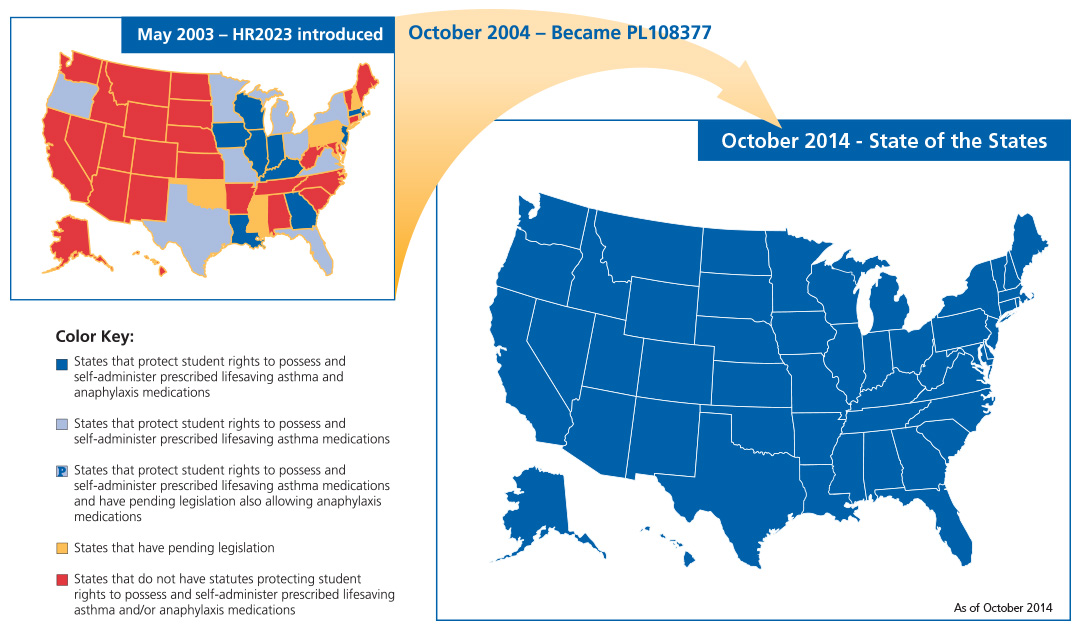What federal laws protect people with asthma and allergies?
The following are key laws that protect people with asthma and allergies in the US.
CDC Public Health Law for Asthma
School Access to Epinephrine Emergency Act
This law amends the Public Health Service Act to increase the preference given, in awarding certain asthma-related grants, to certain States (those allowing trained school personnel to administer epinephrine and meeting other related requirements).
Section 504 of the Rehabilitation Act of 1973
This law is commonly referred to in the school setting and defines a person with a disability as someone who has an impairment (either physical or mental) that substantially limits major life activities (such as eating and breathing and going to school), or who is regarded as having such impairments.
This law prohibits discrimination on the basis of disability and can support families in pursuing appropriate accommodations as needed.
Food Allergen Labeling and Consumer Protection Act of 2004
FALCPA is an amendment to the Federal Food, Drug, and Cosmetic Act and requires that the label of a food that contains an ingredient that is or contains protein from a “major food allergen ” declare the presence of the allergen in the manner described by the law.
What state laws protect people with asthma and allergies?
States have enacted laws that protect people with asthma and allergies. The three laws most relevant to those with asthma and allergies are:
- Student rights to self-carry epinephrine and albuterol inhalers
- School epinephrine and albuterol stocking
- Entity/public place stock epinephrine
Student rights to self-carry epinephrine and albuterol inhalers
All 50 states now have laws protecting students’ rights to carry and use prescribed asthma and anaphylaxis medications.

Why is it important to allow students the right to self-carry their asthma and anaphylaxis medications?
Every school year students have died because they were unable to get to their asthma or anaphylaxis medications on time. The medications were locked in a nurse’s cabinet or stowed away in a place too far to get to when the student needed them. Minutes count when asthma or anaphylaxis strikes. Students need to carry these medications on them, know when and how to use them — and then do it.
What if my child’s school doesn’t allow my child to self-carry asthma and anaphylaxis medications?
Parents, teachers, school nurses — contact local schools and make sure they know these laws exist and what they mean. If you need the text of the law for your state, please contact us.
What was the Network’s role in passing these self-carry laws?
We spearheaded a Breathe: It’s the Law is an awareness campaign to make sure students in every state had the right to carry and self-administer their life-saving asthma and anaphylaxis medications. We played worked with volunteers and legislators in every state to get these laws passed in all 50 states.
In 2002, Allergy & Asthma Network held an Allergy & Asthma Day Capitol Hill briefing about the plight of schoolchildren whose asthma medications were locked in the clinic instead of by their side at all time as prescribed by their physicians. Tragically, each school year there were reports of students who did not receive medication in time. They died. The same was true of students with anaphylaxis and their access to prescribed epinephrine auto-injectors.
As a result of those hearings, members of Congress joined with Allergy & Asthma Network and advocates across the country to pass the “Asthmatic Schoolchildren’s Treatment and Health Management Act of 2004” (H.R. 2023). Signed into law in October 2004, this groundbreaking legislation gave funding preference to states that protect student’s rights to carry and self-administer asthma and anaphylaxis medications at school.
School stock albuterol and asthma management
A number of states across the country have passed laws or guidelines that permit schools to stock albuterol with a prescription and administer it to a student believed to be in respiratory distress and standardize asthma action plans.
This type of preparation and management in schools will not only improve a child’s health, but will also ensure students are able to focus on learning.
Currently 14 states have laws or guidelines to implement asthma action plans and increase access to appropriate and timely asthma treatment for students while in school. Action at the federal level is pending in the 116th Congress. The “School-Based Allergies and Asthma Management Program Act” (H.R.2468) was introduced by House Majority Leader Steny Hoyer (MD) and Rep. Phil Roe (TN) in May 2019 and incentivizes states to act.
Check the status of your state in the map below. States colored light blue do not have stock albuterol legislation.

Why is it important for schools to stock albuterol?
Stock albuterol laws across the country help save the lives of students who experience an asthma attack at school and do not have a prescribed albuterol inhaler with them.
School Stock Epinephrine Laws
All states now have laws that allow or require anaphylaxis emergency preparedness plans that permit schools to stock emergency supplies of epinephrine auto-injectors.
Why is it important for schools to stock epinephrine?
Stock epinephrine laws across the country help save the lives of students who experience anaphylaxis at school and do not have a prescribed epinephrine auto-injector. Access at school is critical because 25 percent of anaphylaxis reactions at school occur in students previously undiagnosed with a severe allergy to food, insect venom, latex or medication.
The stock epinephrine in schools law was often the first of its kind to deal with stocking non-patient specific emergency medications in the school setting. They have since been used as a template or foundation for other emergency medications.

What can I do if my child’s school does not stock epinephrine?
If your state has a law, there could be issues with implementing the law at your child’s school.
If there is not an existing state law, there is still work to be done in statehouses, legislatures and schools as lawmakers and policy makers develop law and implementation policies.
Please contact us for a copy of the law for your state or to find out how you can get involved with improving school access to stock epinephrine in your state.
Entity/public place stock epinephrine
Stock epinephrine has now moved beyond the school walls and out to public venues – from theme parks, restaurants and sports arenas to daycare centers and more. Many states passed entity epinephrine laws that permit public venues to stock emergency supplies of epinephrine auto-injectors.
Why is it important for entities and public places to stock epinephrine?
These laws allow restaurants, theme parks and other public entities to respond to a life-threatening allergic reaction in the event someone experiences anaphylaxis and does not have an epinephrine injector with them.

This article was published here first.

